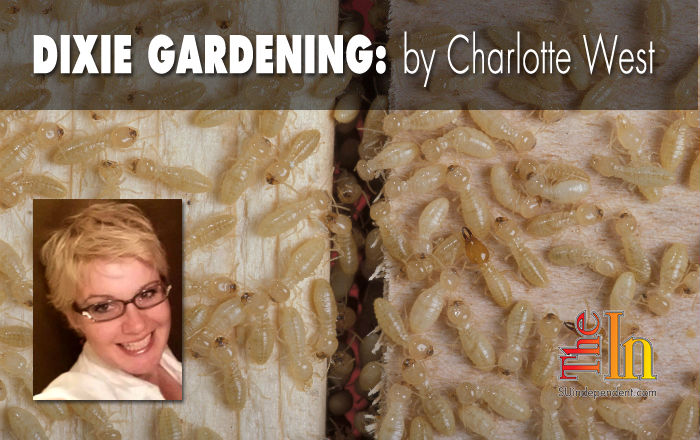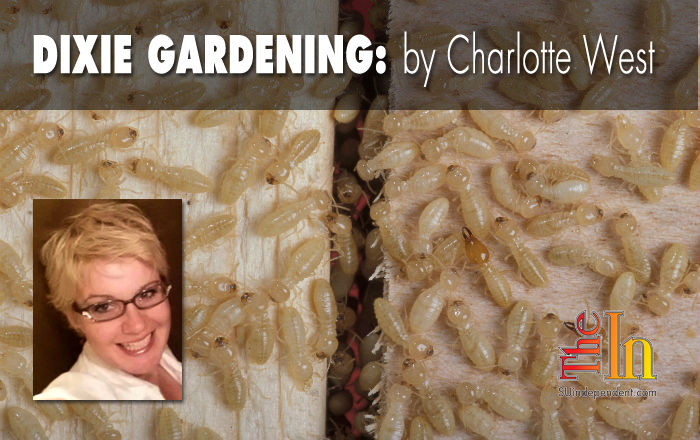 Written by Charlotte West
Written by Charlotte WestWe all want to have a pest free garden. Natural insect and disease control can help create a healthy and toxic free garden. The first step to a poison free garden is to learn about the delicate balance of life forms that reside there. You do not want to upset the natural balance of pests and beneficial insects. If you do your garden can be in trouble. Controlling pests in a non toxic way is actually easier than you think and will save you money.
Let’s start with leaves. Raking fallen leaves doesn’t just make your lawn neater but can actually help control fungi. Leaves left unattended and allowed to winter over become a hot bed for fungi and spores. And come spring those spores will become air born and can infect young leaves and fruit as well. Besides raking your leaves in the fall you can rototill down about one inch and overturn the leaves back into the soil.
Aphids and earwigs are two pests that here in the Dixie gardening area that tend to be a common problem. They usually show up early in your lawn and garden. Aphids come in a great number and color. They basically suck the nutrients out of your plants and cause withering of foliage and general overall loss of vigor. Aphids are particularly fond of nitrogen. So be careful not to over fertilize because the more nitrogen you put into the soil the happier aphids are. You can help control aphids with a good plant washing using a strong spray of water. They are a rather delicate pest and fall off fairly easily. If you have a large infestation you can try a tobacco water spray or mince up some green onions for a spray to help keep aphids off your roses. Or why not try giving aphids a dose of their favorite color. Place bright yellow colored dishpans filled with soapy water throughout your garden to help deter them from your plants.
And earwigs can be nasty with their munching pinchers. But at the same time earwigs can be benefical because they act as scavengers, eating decaying matter and preying on insect larvae, snails, and other slow moving bugs. If, however, your plants are receiving too much damage due to earwigs, do not fret because they fall easily for traps. Placing thin sections of wood down your garden rows will give the earwigs some place to investigate. Simply turn the boards over every morning and scoop them up into a bucket of water. If you have chickens you can give them a yummy earwig breakfast.
Now for ants. I have not met a gardener yet who loves having their toes stung while picking vegetables. Our pets can even be plagued by them. On a large scale, they are not harmful to your garden . But you can place cucumber peelings in a location you don’t mind them relocating to, or powdered charcoal sprinkled throughout your garden will help control them as well.
For some gardeners it’s not the small insects that frustrate them. It is the larger pests like deer. They can be a constant bother for your lawn, orchards, and gardens. Deer establish a regular eating path. Breaking up this path is the key to controlling the damage they can do overnight. There are many homemade suggestions out there but one favorite of mine is to mix about 20 eggs to five gallons of water and use this as a spray. Deer find the smell of rotten eggs offensive. This mixture ratio will cover about 1 acre. And usually the smell is not noticeable to humans, but the deer can pick up on the smell for some distance.
One pest you may not consider a pest is stress. Stress can be a big problem. It can cause a nutrient deficiency in your plants. So remember this good rule of thumb: a deficiency in any element implies excess of other elements. Plants have several requirements for good health such as light, nutrients, water and friendly temperatures. If all of these things are within a good balance then the less susceptible your plants will be to pests and disease.
So spend some quality time with your garden and remember, a pest and poison free garden does not happen over night, but with dedication and patience, it is an achievable goal.




